Ten Years of the EU–Kazakhstan Enhanced Partnership
Derya SOYSAL
A Decade of Strategic Cooperation
Kazakhstan celebrates its National Day on 25 October, and this year Kazakhstan and the European Union celebrate the 10th anniversary of the signing of the Enhanced Partnership and Cooperation Agreement (EPCA), concluded in December 2015. The EPCA established an enhanced legal basis for EU–Kazakhstan relations.

Since then, Kazakhstan has become the strongest partner of the EU in the region. The EU has confirmed that Kazakhstan has demonstrated through a number of actions that it is an indispensable partner for Europe. Indeed, partnership with the EU remains a cornerstone of Kazakhstan’s foreign policy. The Enhanced Partnership and Cooperation Agreement (EPCA) underpins the EU–Kazakhstan bilateral relationship, providing a legal framework for cooperation across 29 sectors.
The growing partnership between Kazakhstan and the European Union covers multiple sectors — from digital transformation and infrastructure development to transport, education, and investment.
That is why, in June 2025, Kazakhstan and the European Union (EU) reaffirmed their commitment to deepening strategic ties during the 22nd meeting of the Kazakhstan–EU Cooperation Committee in Political Configuration (CCPC). The meeting took place between Luc Devigne, Managing Director for Europe and Central Asia at the European External Action Service, and Roman Vassilenko, former Deputy Foreign Minister of Kazakhstan.
“The dialogue focused on evaluating the current dynamics and exploring future opportunities in bilateral relations, with particular attention given to the effective execution of the Enhanced Partnership and Cooperation Agreement (EPCA) between Kazakhstan, the European Union, and its member states,” according to The Astana Times.
For the first time, the European Union signed such an agreement with a Central Asian partner. The EPCA enables the EU and its Member States to advance and strengthen cooperation with Kazakhstan in key policy areas such as promoting mutual trade and investment, cooperation in justice and home affairs, economic and financial cooperation, energy, transport, environment and climate change, employment and social affairs, culture, education and research, according to the European External Action Service.
Ten years of strong partnership, twenty-five years of EU–Kazakhstan relations.
The European Union (EU) and Kazakhstan have established close economic and trade relations. The EU remains Kazakhstan’s first foreign investor and largest trade partner, accounting for 32.4% of its total trade according to official data provided by the European External Action Service. In 2024, bilateral trade rose to $48.7 billion – an increase of 16.9% from 2023 – with exports totaling $38.1 billion and imports $10.6 billion. The trade includes significant exports of energy resources and imports of machinery and equipment, according to the European Economic and Social Committee.
Minister of Foreign Affairs Yermek Kosherbayev met with the Head of the Delegation of the European Union to the Republic of Kazakhstan, Ambassador Aleška Simkić, marking the 10th anniversary of the strategic partnership.

Over 3,000 European-affiliated enterprises now operate in Kazakhstan, working in diverse fields such as energy, manufacturing, finance, logistics, and digitalization — from Shell and TotalEnergies to Siemens, Airbus and Schneider Electric. Since 2005, European investment in Kazakhstan has exceeded $200 billion.
Critical Raw Materials: An Important Vector of Cooperation between Kazakhstan and the EU
On 7 November 2022, European Commission President Ursula von der Leyen and Alikhan Smailov, Prime Minister of Kazakhstan, signed a Memorandum of Understanding (MoU) on Strategic Partnerships on Sustainable Raw Materials, Batteries, and Renewable Hydrogen Value Chains.
On that day, President of the Commission Ursula von der Leyen said:
“A secure and sustainable supply of raw materials, refined materials and renewable hydrogen is a key layer to help build a new, cleaner foundation for our economies, especially as we move away from our dependency on fossil fuels. This partnership with Kazakhstan shows Europe’s commitment to work with partner countries on our shared commitments to a greener and more resilient future in line with the Global Gateway Strategy and the objectives of the REPowerEU Plan. I would like to thank Prime Minister Smailov of Kazakhstan for his efforts and look forward to our cooperation.”
The partnership is centered around three areas of collaboration:
• Closer economic and industrial integration in the strategic value chains of raw materials, batteries and renewable hydrogen;
• Increasing the resilience of raw material, battery and renewable hydrogen supply chains;
• Closer bilateral cooperation on capacity-building, skills, and research & innovation, according to the European Commission.
Kazakhstan indeed plays a strategic role in critical raw materials (CRM). It possesses 33 of the 34 elements identified in the European Commission’s Critical Raw Materials Act. With its abundant mineral resources and strong potential in renewable energy, Kazakhstan is well placed to support Europe’s efforts to strengthen supply chain resilience in clean technology sectors.
As the global energy transition accelerates, the European Union is stepping up efforts to secure supplies of critical minerals essential for green technologies. At the heart of this strategy lies Kazakhstan, a resource-rich Central Asian country increasingly sought after by Western powers. The EU has, for example, included the Sarytogan graphite deposit, located in the Karaganda region of Kazakhstan, in the list of strategic initiatives, according to the Ministry of Industry and Construction of the country.
During a series of meetings held in Brussels in December last year, representatives from the EU and the Kazakh government emphasized the growing importance of their cooperation in the field of strategic raw materials. Roman Vakulchuk, Head of the Climate and Energy Research Group at the Norwegian Institute of International Affairs (NUPI), stated:
“Kazakhstan has a wide variety of mineral reserves. What makes the country truly unique is the proximity of different minerals within its territory.”
In response to this growing interest in rare minerals, the European Commission organized Raw Materials Week in Brussels from December 9–13, 2024. In this context, the Embassy of Kazakhstan hosted two meetings due to the country’s critical role in raw material extraction. Kazakhstan’s reserves are estimated at 230 million metric tons, while global reserves are around 570 million metric tons. It also ranks fifth in the world for zinc reserves and eighth for ore reserves, and is among the top 20 countries for proven reserves of copper, cadmium, and bauxite.
For example the EPCA’s trade and business provisions aim to ensure a better regulatory environment for EU and Kazakh companies in different areas: trade in services, raw materials and energy, and intellectual property rights.
Cooperation in the Field of Energy
Kazakhstan continues to attract attention for its natural resources. The country is rich in oil, natural gas, coal, metals, and uranium (accounting for 40% of the world’s reserves). It is the heavyweight of the regional economy, holding two-thirds of Central Asia’s GDP, as noted in the ARTE documentary Central Asia: At the Crossroads of the Worlds, which underlines that Kazakhstan is expanding its partnerships and strengthening international agreements while maintaining balanced relations with all sides.
Kazakhstan is also the EU’s largest supplier of nuclear energy, meeting more than 21% of its uranium demand. Meanwhile, European multinationals are heavily involved in Kazakhstan’s hydrocarbon production. French oil and gas major TotalEnergies, British–Dutch Shell, and Italian Eni together hold just over 50% of the shares in the Kashagan field, each with 16.81%. Eni also holds a 29.25% stake in the Karachaganak field, while Shell owns 50% of the Arman field, among others.
Cooperation in the Field of Green Transition
Bilateral dialogues on environment and climate change take place under the Subcommittee on Energy, Transport, Environment and Climate Change within the EPCA framework. During the Global Gateway held in Brussels, the minister of Energy of the Republic of Kazakhstan Yerlan Akkenzhenov reiterated Kazakhstan’s strategic goal of achieving carbon neutrality by 2060. The main outcome of the visit was the signing of Memoranda of Cooperation with leading European financial institutions — the European Bank for Reconstruction and Development (EBRD) and the European Investment Bank (EIB). These documents are aimed at mobilizing investments in regional projects, including the Kambarata-1 Hydropower Plant, renewable energy initiatives, and modernization of power grids.
“Kazakhstan has solidified its role as a key partner of the European Union in the field of sustainable energy” wrote Kalimurzina for Anews.
Cooperation in the Field of Transport
Transport connectivity is considered one of the key priorities in the context of deepening the multifaceted Kazakhstan–EU partnership, according to the Embassy of Kazakhstan in Brussels. Kazakhstan and the EU positively assessed cooperation within the framework of the Global Gateway initiative, including the announcement by European Commission President Ursula von der Leyen last April regarding the allocation of a €12 billion investment package aimed at improving infrastructure.
Connectivity also features prominently in their agenda. The Trans-Caspian International Transport Route, or “Middle Corridor,” is increasingly viewed as a viable overland route connecting China to Europe via Kazakhstan, as reported by Ismailov for Times.ca (30 July 2025).
Conclusion
Ten years after the signing of the Enhanced Partnership and Cooperation Agreement, the EU–Kazakhstan relationship stands as a model of strategic, economic, and political collaboration in Central Asia. Built on mutual trust, shared goals, and a common vision for sustainable development, this partnership continues to expand into new areas — from critical raw materials and green energy to transport and digital innovation. As both sides look toward the next decade, the EPCA remains the cornerstone of a dynamic and future-oriented relationship that bridges Europe and Asia.
Bibliography
Anewz. (2025, October 20). Kazakhstan and the EU deepen strategic partnership in green energy. https://anewz.tv/region/central-asia/14188/kazakhstan-and-the-eu-deepen-strategic-partnership-in-green-energy/news
European External Action Service. (2023, October 19). The European Union and Kazakhstan. EEAS. https://www.eeas.europa.eu/kazakhstan/european-union-and-kazakhstan_en?s=222 [eeas.europa.eu]
Eureflect, Ten Years of the EU–Kazakhstan Enhanced Partnership - https://eureflect.com
European Economic and Social Committee. (2025, March 25). Enhancing cooperation between CSOs in the European Union and Kazakhstan. https://www.eesc.europa.eu/en/news-media/press-summaries/enhancing-cooperation-between-csos-european-union-and-kazakhstan [eesc.europa.eu]
European Commission. (2022, November 30). EU strengthens raw materials supply chains with Kazakhstan. [Press release]. https://ec.europa.eu/commission/presscorner/detail/en/ip_22_6585 [ec.europa.eu]
European Commission. (2022, November 7). EU strengthens raw materials supply chains with Kazakhstan [Press release]. https://ec.europa.eu/commission/presscorner/detail/en/ip_22_6585 [ec.europa.eu]
Ismailov, V. (2025, July 30). EU–Kazakhstan relations: Strategic cooperation amid geopolitical shifts. The Times of Central Asia. https://timesca.com/eu-kazakhstan-relations-strategic-cooperation-amid-geopolitical-shifts/ [timesca.com]
Kazinform. (2025, October 19). Kazakhstan, EU continue bolstering co-op, marking 10th anniversary of strategic partnership. https://qazinform.com/news/kazakhstan-eu-continue-bolstering-co-op-marking-10th-anniversary-of-strategic-partnership-2db180
Ministry of Foreign Affairs of the Republic of Kazakhstan. (2025, October 19). Kazakhstan and the European Union signed a Protocol on amendments to the Enhanced Partnership and Cooperation Agreement. GOV.KZ. https://www.gov.kz/memleket/entities/mfa-brussels/press/news/details/1086475?lang=en
Omirgazy, D. (2025, June 18). Kazakhstan, EU reaffirm strategic partnership at Cooperation Committee meeting. The Astana Times. https://astanatimes.com/2025/06/kazakhstan-eu-reaffirm-strategic-partnership-at-cooperation-committee-meeting/ [astanatimes.com]
Soysal, D. (2025, June 5). Kazakhstan: A strategic partner for Europe in the race for critical minerals. Eurasia Focus. https://eurasiafocus.com/kazakhstan-a-strategic-partner-for-europe-in-the-race-for-critical-minerals/ Stevens, C. (2025) Kazakhstan and the European Union: A decade of strategic partnership, shared vision, and growing interdependence – EU Reporter
Ten Years of the EU–Kazakhstan Enhanced Partnership - https://eureflect.com

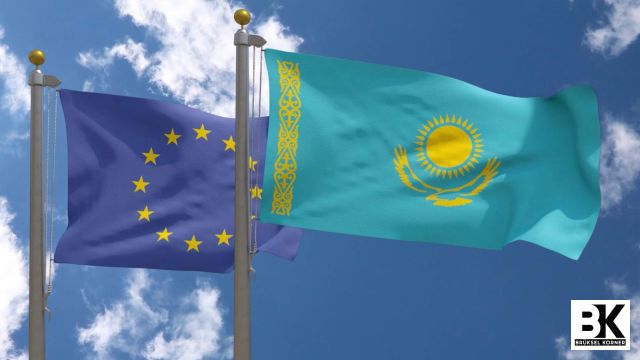




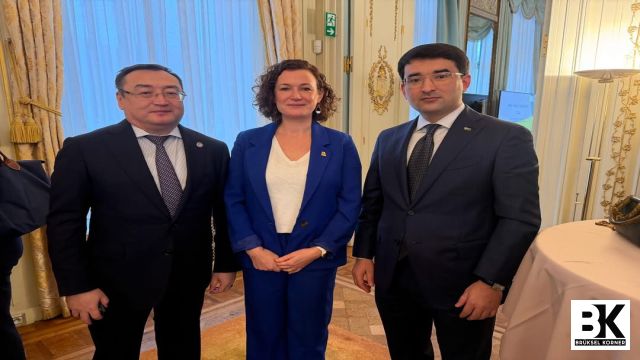
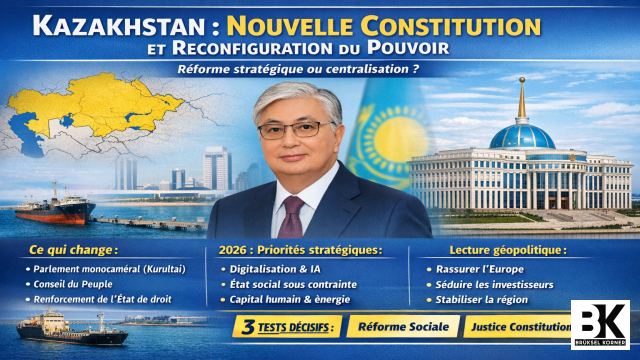
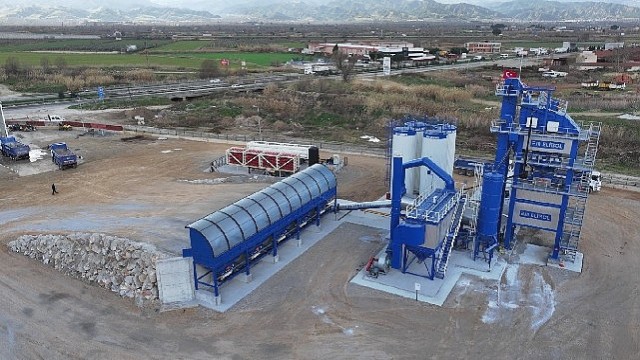
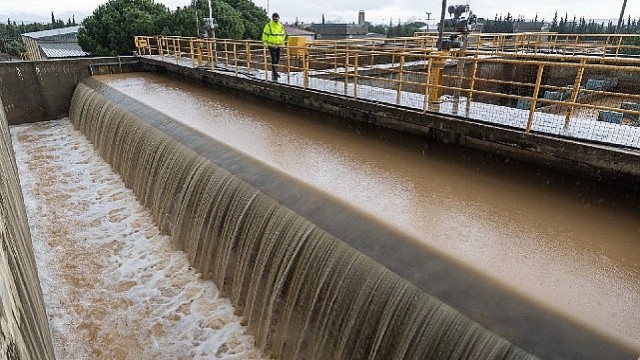
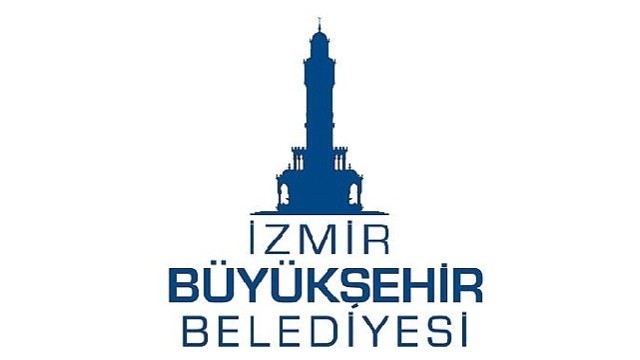
Yorum Yazın